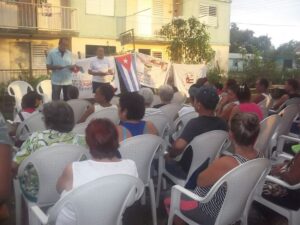Several issues that will be analyzed by the deputies in the Second Ordinary Session of the National Assembly of People’s Power, in its 10th Legislature, convened as from December 20, were examined by the Council of State in its ordinary session this Tuesday headed by the head of this body, Esteban Lazo Hernández, and with the participation, at the National Capitol, of the First Secretary of the Central Committee of the Party and President of the Republic of Cuba, Miguel Díaz-Canel Bermúdez, and Prime Minister Manuel Marrero Cruz.
As part of the meeting’s agenda, the members of the Council of State evaluated the draft laws on the Military Prosecutor’s Office, Public Health, the System of Attention to People’s Complaints and Petitions, and the State Budget for the year 2024; proposals for regulatory provisions that, after the development of the corresponding legislative process, will be submitted next week for consideration by the Cuban Parliament.
On the other hand, the members of this body approved the decree law «Modifying Law 157 «On the State Budget for the year 2024».
2023″, dated December 12, 2022, which sets forth a proposed adjustment to the State Budget for the current year and, as a result, an increase in the fiscal deficit approved by law is estimated, which affects the amount of the public debt.
Vladimir Regueiro Ale, Minister of Finance and Prices (MFP), explained that this proposal was presented by the Executive Committee of the Council of Ministers, at the request of the MFP, taking into account the limitations of financial resources of the State Budget to support the expenditure demands in the budgeted and business sectors, as well as the effects on revenue collection.
Finally, the Minister of Justice, Oscar Manuel Silvera Martínez, together with the Constitutional and Legal Affairs Committee of the National Assembly, reported on the compliance with the Legislative Schedule and the proposals for updating this text, which will be submitted to the supreme body of the State power.
Among the main challenges of the legislative process, Silvera Martinez mentioned «guaranteeing the quality of the proposals by strict compliance with the Constitution and the Legislative Schedule, coherence in the legal order, high scientific rigor and social consensus» and correctly complying with the indications of the President of the Republic that allow popular participation in the legislative activity, with the realization of specialized consultations, publication in the official web sites of the institution and consultation with experts in Marxism. Likewise, he insisted on the importance of eliminating the deficiencies that remain in the planning and compliance with the schedules for the elaboration of the norms.




